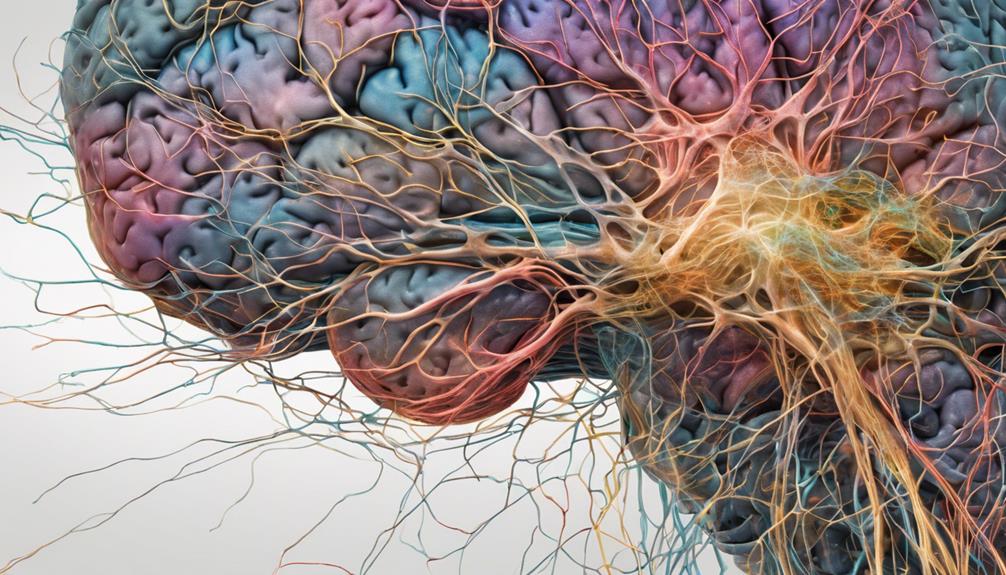As we get older, changes in memory and cognitive function are natural. It is common to experience occasional memory lapses, but they do not always indicate serious cognitive issues. It is important to distinguish between normal age-related forgetfulness and more significant cognitive problems. Engaging in mentally stimulating activities, exercising, and managing stress properly can help support brain health and prevent memory issues. Lifestyle changes such as social interactions and getting good sleep can also help reduce memory problems. Activities that boost memory, brain games, and daily mental challenges all contribute to maintaining cognitive function. Understanding the causes of age-related memory decline is crucial, and consistent efforts to boost memory can improve brain health. Further insights are waiting for you to explore.
Key Takeaways
- Occasional memory lapses are common in aging.
- Differentiate between normal forgetfulness and cognitive issues.
- Maintain brain health with mental stimulation and exercise.
- Implement memory-boosting lifestyle changes.
- Understand causes like hippocampal deterioration for memory decline.
Understanding Age-Related Memory Changes
As we age, our memory undergoes changes that often manifest as slower recall due to physiological shifts in the brain. It's normal for older individuals to experience some decline in cognitive functions, including memory. Occasional memory lapses, such as forgetting names or appointments, are common as part of the aging process. These changes are typically mild and don't necessarily indicate cognitive problems.
Physiological changes in the brain can lead to difficulties in recalling recent details, but it's important to understand the difference between normal age-related memory decline and more serious cognitive issues. While occasional memory lapses are to be expected, significant and persistent memory problems could be a sign of something more concerning.
Differentiating Forgetfulness From Cognitive Issues

Differentiating normal age-related forgetfulness from cognitive issues involves recognizing patterns of memory lapses and evaluating their impact on daily activities. While occasional memory lapses, such as forgetting names or where you placed your keys, are common with aging, persistent memory problems that interfere with daily tasks signal potential cognitive issues. Determining the difference between the two is essential for providing appropriate intervention and support to maintain cognitive function and independence. To help clarify these differences, let's look at a table comparing normal age-related forgetfulness with cognitive issues:
| Normal Age-Related Forgetfulness | Cognitive Issues | |
|---|---|---|
| Memory Symptoms | Occasional memory lapses | Persistent memory problems |
| Impact on Daily Life | Minimal | Significant changes in tasks |
| Cognitive Function | Generally intact | Noticeable decline |
| Intervention | Lifestyle adjustments | Medical and therapeutic care |
Understanding these distinctions can guide individuals and caregivers in addressing memory concerns effectively and seeking the right support for managing memory gaps as they age.
Importance of Brain Health in Aging
When considering aging, it becomes evident that maintaining brain health is paramount for improving cognitive function and overall quality of life. Engaging in mentally stimulating activities, such as solving puzzles or learning new skills, can provide essential support for brain health as we age. Additionally, regular physical exercise and a diet rich in antioxidants play an important role in benefiting the brain health of older adults. Ensuring an adequate amount of sleep and effective stress management are also key factors in preventing memory issues and cognitive decline.
Furthermore, quitting smoking can greatly enhance brain circulation and reduce the risk of memory problems in aging individuals. By prioritizing these aspects of brain health, we can positively impact our cognitive function and overall quality of life as we grow older. It's essential to incorporate these practices into our daily routine to maintain a healthy brain and reduce the risk of age-related cognitive decline.
Strategies for Memory Loss Prevention

To prevent memory loss, we should incorporate memory-boosting lifestyle changes and cognitive training techniques into our daily routines.
Regular physical exercise, like walking several miles each week, can help keep our brains healthy and combat memory decline.
Engaging in cognitive activities such as playing strategy games, solving puzzles, and learning new skills can stimulate our brains and improve memory function.
Memory-Boosting Lifestyle Changes
Engaging in social activities has been shown to reduce the risk of memory problems and cognitive decline. Prioritize ample sleep for peak memory consolidation and brain health. A well-rounded diet abundant in antioxidants supports cognitive function and memory. Regular physical exercise, like walking 6-9 miles weekly, can prevent brain shrinkage and improve memory. Stimulate your brain with activities like word games, puzzles, and learning new skills to combat memory loss. To enhance memory and cognitive function, consider incorporating the following lifestyle changes:
| Lifestyle Changes | Benefits |
|---|---|
| Engage in social activities | Reduces memory problems and cognitive decline |
| Prioritize ample sleep | Supports memory consolidation and brain health |
| Adopt a well-rounded diet abundant in antioxidants | Enhances cognitive function and memory |
Cognitive Training Techniques
Implementing cognitive training techniques is vital for preventing memory loss and enhancing cognitive abilities in older adults. These techniques, such as mnemonic strategies, spaced retrieval, and cognitive stimulation, can improve memory, attention, and problem-solving skills.
By engaging in memory training interventions, older adults may experience benefits in cognitive abilities and everyday functioning. Cognitive training can also induce neuroplastic changes in the brain, enhancing neural connections and overall cognitive function.
Personalized cognitive training plans tailored to individual needs are essential for optimizing memory performance and cognitive health in older adults. Hence, incorporating cognitive training into daily routines can play a significant role in maintaining and enhancing cognitive abilities as individuals age.
Causes of Age-Related Memory Decline

Age-related memory decline is primarily caused by the deterioration of the hippocampus, an important brain region responsible for memory formation. As we age, hormonal and protein changes occur in the brain, contributing to memory loss. Reduced blood flow to the brain in older adults can also impair memory function over time.
These normal age-related changes collectively lead to cognitive decline. Understanding these causes is important in managing age-related memory decline. By recognizing the impact of hippocampus deterioration, hormonal changes, protein changes, and reduced blood flow on memory formation, individuals can take proactive steps to support brain function. Engaging in mental exercises, maintaining a healthy diet, and staying physically active are some strategies that may help mitigate cognitive decline. In particular, deciphering corticobasal degeneration, a rare but severe neurodegenerative disorder, could provide additional insight into how specific brain changes contribute to memory and functional deficits as we age. By furthering our knowledge in this area, researchers may uncover new ways to preserve cognitive abilities and improve quality of life for older adults.
Addressing these factors early on can help manage memory decline and potentially mitigate its effects. It's important to stay informed about these causes and consider implementing strategies to support cognitive health as we age.
Lifestyle Changes to Combat Memory Loss

To combat memory loss, incorporating lifestyle changes can play an essential role in supporting brain health and cognitive function. Engaging in social activities, quitting smoking, managing stress, getting enough sleep, and maintaining a balanced diet are key factors in preventing memory problems and cognitive decline associated with normal aging.
| Lifestyle Changes | Benefits | Importance |
|---|---|---|
| Social activities | Reduce the risk of memory problems | Promotes cognitive health |
| Quit smoking | Improves brain circulation | Supports memory function |
| Stress management | Prevents memory issues | Enhances overall brain health |
| Adequate sleep | Aids memory consolidation | Crucial for cognitive function |
| Balanced diet | Supports brain health | Enhances memory retention |
Cognitive Exercises for Memory Maintenance

Engaging in memory-boosting activities, like solving puzzles or crosswords, can effectively support memory maintenance. Brain games and daily mental challenges are excellent ways to keep our minds sharp and active.
These activities help stimulate our brains and promote cognitive health, making them vital components in preserving memory function as we age.
Memory Boosting Activities
Participating in memory-boosting activities such as puzzles, crosswords, and Sudoku can greatly enhance cognitive function and memory retention. Engaging in physical exercise is also beneficial as it improves blood flow to the brain, supporting memory maintenance. Learning new skills or languages stimulates brain activity, aiding memory formation. Additionally, practicing mindfulness meditation and relaxation techniques can reduce stress levels, ultimately improving focus and memory. Social interactions and group activities are equally important as they stimulate the brain, enhancing memory and cognitive abilities.
- Engage in puzzles, crosswords, and Sudoku.
- Incorporate regular physical exercise.
- Learn new skills or languages.
- Practice mindfulness meditation and relaxation techniques.
Effective Brain Games
Brain games such as Sudoku, crossword puzzles, and memory matching games have been proven to enhance memory and cognitive function. Engaging in these cognitive exercises can help delay age-related memory decline by stimulating mental processes and promoting neuroplasticity.
Virtual brain training programs like Lumosity and Elevate offer personalized cognitive workouts tailored to maintain memory function. Additionally, participating in strategic games such as chess or certain video games can challenge the brain and support memory retention.
Daily Mental Challenges
To maintain cognitive function and memory health, incorporating daily mental challenges into your routine is essential. Here are some effective ways to keep your brain sharp and memory intact:
- Engage in crossword puzzles, Sudoku, or brain teasers regularly.
- Learn a new language, musical instrument, or skill to challenge your brain.
- Participate in memory games, trivia quizzes, or online cognitive training programs to enhance mental acuity.
- Read books, articles, and engage in discussions to stimulate your brain and promote memory health.
Frequently Asked Questions
How Do You Slow Down Age Related Cognitive Decline?
To slow down age-related cognitive decline, we engage in regular physical exercise, stay mentally active with puzzles and learning, maintain a healthy diet rich in antioxidants, prioritize quality sleep, and manage stress through relaxation techniques.
What Is Normal Cognitive Decline With Aging?
As we age, normal cognitive decline involves changes in memory, attention, and processing speed. Gradual declines in fluid cognitive abilities like problem-solving occur. Challenges in set shifting and working memory functions may arise, along with slower information recall.
How Long Does It Take for MCI to Turn Into Dementia?
It typically takes around 5 years for mild cognitive impairment (MCI) to progress to dementia, with about 50% of individuals advancing within that timeframe. Factors like age and severity of impairment play a role in this progression.
How Do You Treat Age Related Cognitive Decline?
We treat age-related cognitive decline through lifestyle changes like exercise, a healthy diet, and mental activities. Engaging socially and managing health conditions early are essential. These practices can slow cognitive decline and improve overall brain health as we age.
Conclusion
To sum up, as we age, it's natural for our memory to experience some changes. Remember, Rome wasn't built in a day, and neither is a sharp mind.
By staying active, eating well, and challenging our brains with new activities, we can help maintain our cognitive abilities.
So, don't be discouraged by forgetfulness – it's all part of the journey of growing older. Keep learning, keep moving, and keep your brain in top shape for years to come.









